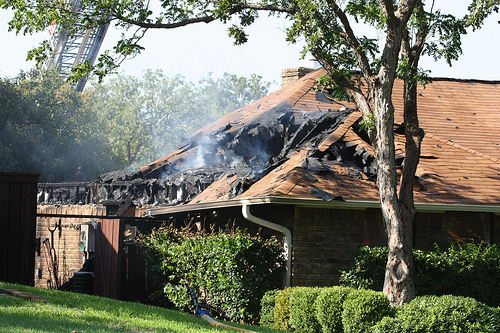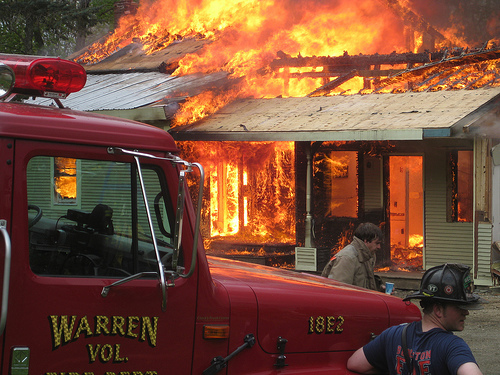
House fires can be nightmarishly destructive and deadly.
House fires are a major concern in most American homes. A fire can cause life-long injury, destroy thousands of dollars in property, and throw you into a lengthy case against your insurance company. It’s better to stop fires before they start; here are five tips to do just that.
1. Take the Whole Family to a Fire Safety Course… Yourself Included
We all had a class about fire safety in grade school, but things have probably changed between then and now. So, contact your local public safety or fire department and ask them about fire safety classes they teach. Part of stopping fires is ensuring that they don’t start in the first place, and part of surviving a fire is knowing what to do and why if you have to deal with one. Make sure the people you love most will be safe if they have to escape with, or stop, a fire.
2. Clean Your House, Gutters to Garage
A clean house is a safer house when it comes to fires. For example, gutters are, by their very nature, a magnet for the kind of stuff you don’t want near your house. Dead leaves, animal nests, twigs, and other crud collect in there; all it takes is a dry season and a spark, and you have a trough full of kindling right next to your roof. So, be sure to maintain your gutters by having them cleaned at least once every six months or so, or install gutter guards to keep this stuff from collecting in the first place.
Similarly, get anything that you don’t need and might burn — like old newspapers and magazine, old rags, and other flammable materials — in trash bins and on the curb. The further from your house that stuff is, the better.
3. Ensure Your Fire Safety Equipment Is Charged and Ready to Go
Every home should have a fire extinguisher and at least one smoke alarm (preferably more), located near certain areas such as the kitchen and the bedroom. Fire extinguishers should be rated to put out most fires, and should be fully charged. And as annoying as that beeping and wailing can sometimes be, check your smoke detector’s batteries once a month, or switch to a hardwired system.

House fires can strike terrifyingly fast.
4. Update Your Roof
If your roof is getting up there in terms of years, look into getting a new roof. Roofing has changed substantially, especially in the last few years, and roofs are now more fireproof and better able to help you control fires if they happen. Roofing for homes is rated on a grade scale; A, B, C, or not ratable. Look for roofing materials rated A, and remember that the fire rating is not generally a lifetime guarantee, so speak to your roofing company about a maintenance schedule. Also, be aware that fireproofing spray can only do so much; replacing the materials is a better option.
5. Check Your Wiring
You’d be surprised how often electrical shorts and other electrical problems cause house fires; old wiring can have its insulation worn away over time, or be chewed through by vermin, and then it’s only a matter of time before something goes wrong. Especially if lights are flickering, fuses keep blowing, or you have other power problems, consult with an electrician about wiring inspection and repairs. Catching these problems before they start is often key.
Let Moonworks help you keep your home safe from fire. Contact Moonworks today and take an important step in keeping your house and family safe.
